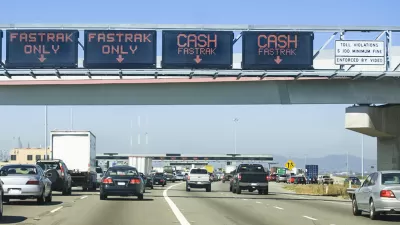The House voted 387-35 on Tuesday to extend transportation funding for two months—using the remaining funds in the Highway Trust Fund.
The current patch, or short term, transportation funding bill expires on May 31. However, as posted last month, Highway Transportation Funds should last about two more months.
Unless Congress passes an extension by May 31, however, gas tax collections cease and transportation funding shuts down, so the Senate is expected to pass the House bill, H.R.2353 that passed on Tuesday. Politico transportation reporter Jennifer Scholtes, with help from Bob King, explain in Thursday's Morning Transportation and earlier ones listed below:
House lawmakers expect to be on their way back home for their weeklong Memorial Day recess by early afternoon today, leaving the Senate with no other option than to clear their transportation policy plan exactly as they passed it
Stephen Lee Davis of Transportation for America provides the extension "count" for those who care:
If the Senate does as expected and approves the bill and sends the extension to President Obama for his signature before the 31st, (it) marks the 33rd time [my emboldens] Congress has passed a short-term extension over the last six years rather than do what Americans sent them to Congress to do: legislate and make the tough decisions to move America forward.
The last year that Congress passed a six-year reauthorization bill SAFETEA-LU in 2005. It expired on September 30, 2009. Congress has passed extensions ever since.
In the cleverly worded, "Patching the patch" section in Tuesday's Morning Transportation (MT), Scholtes writes, "House [Transportation & Infrastructure] T&I Chairman Bill Shuster [see his press release] admitted Monday that this likely won't be the patch to end all patches and that Congress will probably vote before the end of July for a temporary extension that would last until sometime toward the end of the year."
Is there a limit to the patches?
In Wednesday's MT, Scholtes writes about the growing frustration of ranking member House T&I ranking Democrat Peter DeFazio (Ore.)
“I think the rank and file are getting very restless,” DeFazio told reporters on Tuesday. “You get 40 Republicans who are in the devolution, tea party crowd. But the rest of the Republican Conference, which is more than 200 … people, they want to see a long-term bill. They want to see the investments.” And Democrats aren’t going to be so quick to cede to another patch either, he said
Bottom line: Yes, expect another patch bill in July, but it will be more difficult to pass as revenue will be needed to offset General Fund transfers, i.e., bailouts, to the Highway Trust Fund. The current patch bill relied greatly on a the questionable strategy known as pension smoothing. In addition, amendments may be added to end future patches to pressure Congress to pass a six-year reauthorization bill.
Speaking of the long-awaited MAP-21 Reauthorization, on May 19, DeFazio "together with 19 Committee Democrats, introduced H.R. 2410, the Administration’s GROW AMERICA Act, a long-term surface transportation reauthorization bill that provides robust funding and sustainable solutions to our Nation’s infrastructure crisis," according to his press release. "Democrats offered the six-year, $478 billion bill as a framework, to provide Congress with robust investment targets."
FULL STORY: MT: Transportation patch waits on Senate sideline [May 21]

Planetizen Federal Action Tracker
A weekly monitor of how Trump’s orders and actions are impacting planners and planning in America.

Congressman Proposes Bill to Rename DC Metro “Trump Train”
The Make Autorail Great Again Act would withhold federal funding to the system until the Washington Metropolitan Area Transit Authority (WMATA), rebrands as the Washington Metropolitan Authority for Greater Access (WMAGA).

The Simple Legislative Tool Transforming Vacant Downtowns
In California, Michigan and Georgia, an easy win is bringing dollars — and delight — back to city centers.

The States Losing Rural Delivery Rooms at an Alarming Pace
In some states, as few as 9% of rural hospitals still deliver babies. As a result, rising pre-term births, no adequate pre-term care and harrowing close calls are a growing reality.

The Small South Asian Republic Going all in on EVs
Thanks to one simple policy change less than five years ago, 65% of new cars in this Himalayan country are now electric.

DC Backpedals on Bike Lane Protection, Swaps Barriers for Paint
Citing aesthetic concerns, the city is removing the concrete barriers and flexposts that once separated Arizona Avenue cyclists from motor vehicles.
Urban Design for Planners 1: Software Tools
This six-course series explores essential urban design concepts using open source software and equips planners with the tools they need to participate fully in the urban design process.
Planning for Universal Design
Learn the tools for implementing Universal Design in planning regulations.
Smith Gee Studio
City of Charlotte
City of Camden Redevelopment Agency
City of Astoria
Transportation Research & Education Center (TREC) at Portland State University
US High Speed Rail Association
City of Camden Redevelopment Agency
Municipality of Princeton (NJ)



























